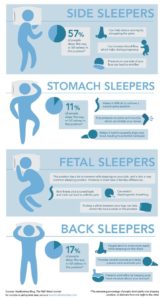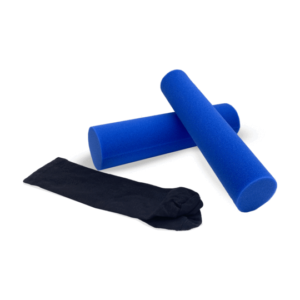Does sleep position affect your health?
“How did you sleep?” It is a common question that we ask our family members in the mornings.
Have you ever thought about why we ask that? It is such a routine thing to say in the morning that sometimes we don’t give too much thought to why we say it. So why does that matter to us whether someone slept well or not?
Well, for one, we want our loved ones to have a great night’s sleep for no other reason than we love them. Second, we want to know so we can (subconsciously) prepare ourselves for the mood of the day. When you hear the answer: “I slept great!” you can suspect that the person will be in a good mood today and interactions with the said person should go smoothly. OR you know, “the mood” when you don’t have a good night’s sleep?! Cranky, achy, complaining of sore body, short on patience, tired all day, lack of focus and the list goes on.
Position of Sleep
Let’s talk about the actual best position of sleep without getting into the science of sleep such as adequate hours, deep or REM sleep, and mitochondria. We are a chiropractic practice after all, who should pass on some advice about sleeping positions if not the person who cares for your spine, right?!
This topic is super relevant to our household since tonight, as a part of an advent calendar activity, our family will “camp” under the Christmas tree…on.the.living. room. floor. If you are a seasoned camper you know this could make or break the next day.
So where you sleep and what position you sleep in is super important. It defines the tone of the following day. (FYI, this activity was purposefully planned on a night when the next day Dr. John does NOT have open hours, just in case. You are welcome!)
In all seriousness, I want you to keep track for a few days of what position you lay at the time you are about to fall asleep, and the position you are in when you wake up.
- Do you wake up with neck pain? – You might be a stomach sleeper. When you lay on your stomach, you generally will have your neck in a rotated position. Staying in this position for prolonged periods of time can result in muscle imbalance, tension, neck pain, and headaches.
- Shoulder pain? – It indicates that you sleep on your side often. Most people who sleep on their side will rotate their pelvis in an incorrect position. This can cause low back pain as well.
- Snoring at night? Waking up with a stiff back? You must lay on your back most of the night.
Which sleep position is the best?
It depends on your personal health history. There are pros and cons of each but make sure you talk to Dr. Steffens if you wake up with a sore and stiff neck and back. He will be able to tell you what position is the best for you individually for optimal health.
Check out this infographic below about each sleep position and let’s go over them briefly.

Stomach sleeper
Pros: No snoring. This may be the only benefit of sleeping on your stomach
Cons: Most experts agree that stomach sleeping is best avoided because it alters the natural curve of your lower spinal column, also known as the lumbar area. It may also negatively affect your neck by stressing joints and muscles and contributing to numbness, tingling, and pain in your extremities.
Tip: If you prefer sleeping on your stomach, try to shift positions several times in the night and gradually reduce the amount of time you spend on your stomach (ideally until you avoid the position altogether).
Side sleeper
Pros: It reduces acid reflux by keeping your head elevated above your stomach. If you have a good mattress and a pillow between your knees it can keep your spine in a good neutral position. Preferred sleeping position during pregnancy as laying on the left side increases blood flow.
Cons: Constant mushing of the face on one side can increase wrinkles and breast sagging for women. Nerve compression and muscle tightness in your shoulders and neck are also two possible musculoskeletal problems associated with side sleeping.
Tip: Use a pillow under your head that is as thick as the height of your shoulders so your head is neither elevated nor hanging lower than your shoulder. This will keep your cervical spine in a neutral position. Also, try alternate sleeping on both sides.
Fetal Sleeper
Pros: It may reduce snoring. No other benefits, sorry.
Cons: Prolonged periods of the curved spine and bent knees will create bad posture and arthritic pain. It restricts diaphragmatic breathing causing other health problems. Avoid this position as much as you can.
Back Sleeper
Pros: According to most musculoskeletal experts this is the best sleeping position. It allows your spine to rest in a neutral position which prevents back and neck pain.
Cons: This is the worst position for snoring and sleep apnea.
Tip: Use a pillow as flat as possible to keep your head and spine in the same elevation. Consider using neck rolls, a small cylindrical pillow that provides support for your neck without elevating your head.
What else should you know?
Bed
Picking out the surface of your sleep is just as important. Knowing your typical sleeping positions will help to find the right type of mattress. The best advice for all sleeper types is to choose a medium-firm mattress with the right support. A surface that is firm enough to distribute your weight comfortably while maintaining a proper curve in your lower back.
Pillows
Back sleepers should ditch the pillows and use “neck rolls” periodically instead.
Side sleepers need to find a thick pillow that is thick enough to fill the entire gap between your neck and your mattress, as this will keep your head and neck in a neutral position and reduce the strain on your neck ligaments, muscles, and other connective tissues. If you regularly switch from your side to your back, it can be hard to find a pillow that’s ideal for both positions, but there are options available so try to find one that works for you.

In conclusion, just remember this: position, surface, and bedding matter for the physical body when it comes to a good night’s sleep. Finding the best position, pillow or mattress is a journey in which your chiropractor can be a great help.
If you are in the northeast part of Denver and you often wake up with neck pain, lower back pain, headaches, and muscle, and joint problems, schedule an appointment so we can help you improve your spinal health.
